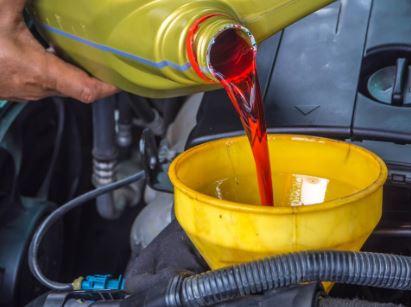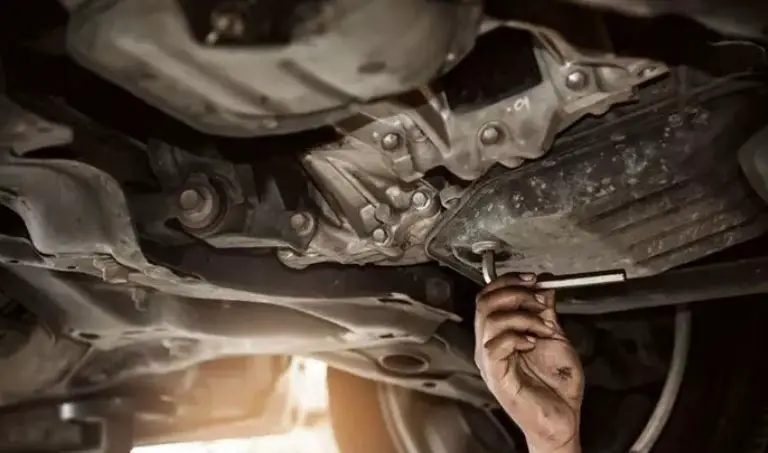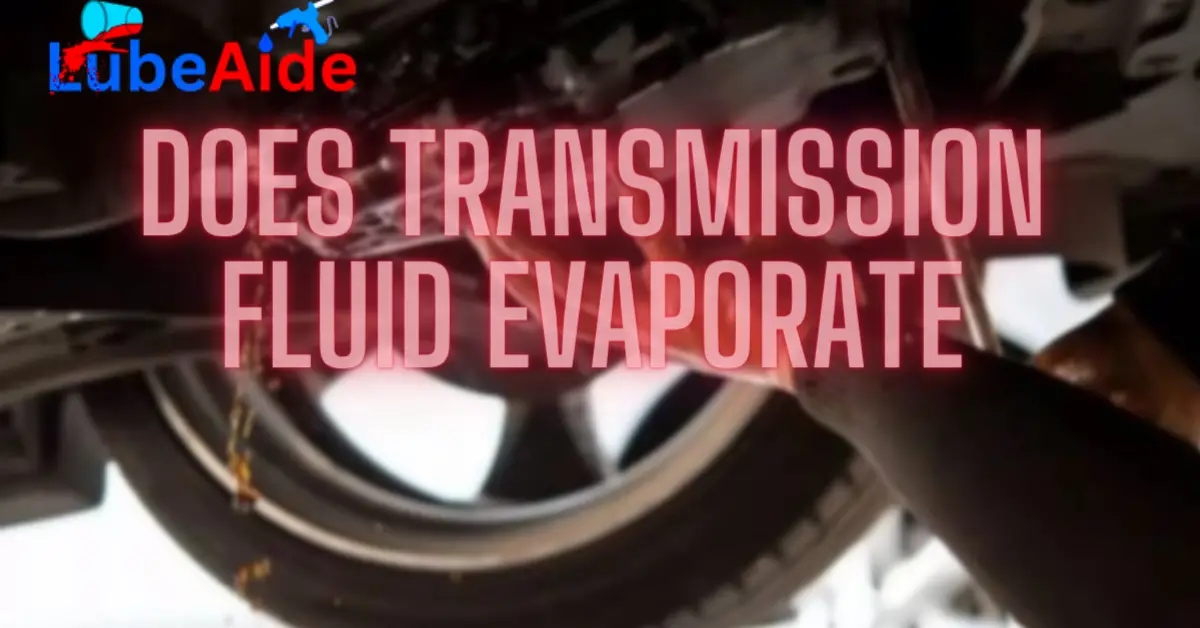Transmission fluid is a critical component in the proper functioning of a vehicle’s transmission system. It acts as a lubricant, ensuring smooth gear shifting and reducing friction and wear on transmission parts. Many vehicle owners are familiar with the need to periodically check and replace transmission fluid to maintain optimal performance. However, one question that may arise does transmission fluid evaporate over time. We will go into the subject of transmission fluid evaporation, including what it is, potential causes, and results on a car’s transmission system. Understanding the evaporation of transmission fluid can help vehicle owners make informed decisions about their transmission maintenance routine and ensure their vehicle’s longevity and performance.
Understanding Transmission Fluid

A unique kind of lubricant called transmission fluid is essential to the proper operation of a car’s transmission system. Found in automatic and manual transmissions, it serves as both a lubricant and a coolant, helping to facilitate smooth gear shifting and reducing friction and wear on the transmission components.
Transmission fluid is typically formulated with a combination of base oils and additives that provide essential properties such as viscosity, thermal stability, anti-foaming, anti-wear, and corrosion protection. The viscosity of transmission fluid is especially important as it determines the fluid’s ability to flow and maintain a protective film between moving parts, which is vital for smooth gear changes.
In automatic transmissions, transmission fluid also serves as a hydraulic medium, enabling the transmission to engage and disengage gears automatically, based on the engine speed, vehicle speed, and driver input. In manual transmissions, the fluid provides lubrication to the gears, bearings, and synchromesh, allowing for smooth gear shifts.
Regular maintenance of the transmission fluid is crucial to ensure the transmission system’s proper functioning. Over time, transmission fluid can become contaminated with debris, heat, and wear particles, which can degrade its performance and compromise the transmission system’s efficiency. In order to maintain peak performance and increase the longevity of the transmission system, it is crucial to adhere to the manufacturer’s advised maintenance schedule and have the transmission fluid checked and, if necessary, updated.
Factors Affecting Transmission Fluid
- Temperature: The temperature at which a vehicle operates can greatly impact the transmission fluid. High temperatures can cause the fluid to break down faster, leading to reduced lubrication and increased friction and wear on transmission parts. On the other hand, extremely low temperatures can cause the fluid to thicken and become less effective in transferring power. It is essential to operate the vehicle within the recommended temperature range to prevent adverse effects on the transmission fluid.
- Driving Conditions: The type of driving conditions a vehicle is subjected to can also impact transmission fluid. Stop-and-go traffic, heavy towing, and driving in mountainous terrains can put additional stress on the transmission system, causing the fluid to heat up and degrade more quickly. Regular maintenance, including more frequent fluid changes, may be necessary for vehicles that are subjected to severe driving conditions.
- Age and Mileage: The age of the vehicle and its mileage can also affect the transmission fluid. Over time, the fluid can become contaminated with dirt, debris, and metal particles from normal wear and tear. This can lead to reduced performance and increased risk of transmission problems. It is important to follow the manufacturer’s recommended maintenance schedule, including regular fluid changes based on the vehicle’s age and mileage.
- Quality of Fluid: The quality of the transmission fluid used can also impact its performance. It is crucial to use the type of fluid recommended by the vehicle manufacturer, as different vehicles may require different types of transmission fluid. Using low-quality or incorrect fluid can result in poor performance and potential damage to the transmission system.
- Fluid Leaks: Any leaks in the transmission system can result in loss of fluid, which can lead to reduced lubrication and potential damage to transmission parts. Regularly checking for and repairing any fluid leaks can help maintain the optimal level of transmission fluid and prevent potential issues.
Does Transmission Fluid Evaporate

Transmission fluid is a vital component in the operation of a vehicle’s transmission system, as it serves as a lubricant that helps facilitate smooth gear shifts and prevents friction and wears on transmission parts. As with any fluid, transmission fluid can undergo evaporation, which is the process of converting from a liquid to a gas or vapor state. However, the extent to which transmission fluid evaporates and its effects on the transmission system can vary depending on several factors.
One factor that can affect transmission fluid evaporation is temperature. The fluid can vaporize more quickly at higher temperatures because evaporation can happen more quickly at those temperatures. This is particularly relevant in hot climates or during prolonged periods of driving where the transmission may heat up significantly. Additionally, severe driving conditions such as towing heavy loads or driving in stop-and-go traffic can generate excess heat in the transmission, potentially leading to increased fluid evaporation.
Another factor that can impact transmission fluid evaporation is the type and quality of the transmission fluid used. Different types of transmission fluids, such as conventional or synthetic fluids, can have varying evaporation rates. Lower-quality or contaminated fluids may also evaporate more quickly, as they can contain volatile components that readily vaporize.
The loss of transmission fluid due to evaporation can have detrimental effects on the performance and longevity of the transmission system. Insufficient fluid levels can result in reduced lubrication, increased friction and wear, and potential overheating of the transmission. Over time, these issues can lead to transmission damage, poor shifting performance, and even transmission failure.
To mitigate the effects of transmission fluid evaporation, regular maintenance, and monitoring of fluid levels are essential. This includes checking the fluid level according to the manufacturer’s recommended intervals and topping off or replacing the fluid as needed. It is also crucial to use the appropriate type and quality of transmission fluid recommended by the vehicle manufacturer to ensure optimal performance and minimize evaporation.
Effects of Transmission Fluid Evaporation
- Reduced Fluid Level: This fluid evaporating over time can lead to a decrease in fluid level within the transmission system. This can result in insufficient fluid to properly lubricate and cool the transmission components, leading to increased friction, heat, and wear. Inadequate fluid levels can also affect the hydraulic pressure required for smooth gear shifting, resulting in harsh shifting or slipping, which can ultimately lead to transmission damage.
- Increased Operating Temperature: This fluid plays a crucial role in dissipating heat generated during the transmission operation. When the fluid level is low due to evaporation, the transmission may not be able to effectively regulate its operating temperature, leading to higher temperatures. Elevated temperatures can cause the transmission fluid to break down more quickly, reducing its ability to lubricate and protect transmission components, and potentially resulting in accelerated wear and damage.
- Accelerated Wear and Damage: Without sufficient transmission fluid, the transmission components may experience increased friction and wear, which can lead to premature damage or failure. Over time, this can result in costly repairs or even complete transmission failure, requiring replacement.
- Poor Transmission Performance: Evaporated transmission fluid can also affect the overall performance of the transmission system. Insufficient fluid levels can result in delayed or erratic shifting, slipping, or jerking during gear changes, reduced acceleration, and decreased fuel efficiency. These issues can significantly impact the driving experience and overall performance of the vehicle.
- Increased Maintenance Requirements: If transmission fluid evaporates frequently, it may require more frequent fluid checks and top-ups or more frequent fluid changes, leading to increased maintenance costs and inconvenience for vehicle owners.
Preventing Transmission Fluid Evaporation
- Regularly check transmission fluid levels: One of the simplest and most effective ways to prevent evaporation is to regularly check the fluid levels according to the manufacturer’s recommended maintenance schedule. This allows you to identify any potential fluid loss early on and take appropriate action, such as adding more fluid or fixing any leaks.
- Fix leaks promptly: These fluid leaks can be a common cause of fluid evaporation. If you notice any signs of a leak, such as red or brown stains under your vehicle, a burning smell, or difficulty shifting gears, it’s crucial to address the issue promptly. Ignoring a transmission fluid leak can lead to further fluid loss and damage to the transmission system.
- Avoid overloading or overheating the transmission: Overloading or overheating the transmission can also contribute to fluid evaporation. Avoid excessive towing or carrying heavy loads that put extra strain on the transmission, and avoid prolonged driving in extreme conditions such as high temperatures or stop-and-go traffic. Overheating can cause the transmission fluid to break down and evaporate more quickly, so practicing safe driving habits can help prevent this issue.
- Use the recommended transmission fluid: Using the manufacturer’s recommended type and grade of transmission fluid is crucial to prevent evaporation. Different vehicles require different types of transmission fluid, and using the wrong type or grade can lead to fluid evaporation or damage to the transmission system. You should always check your owner’s handbook or speak with a skilled mechanic to be sure you’re using the right transmission fluid for your car.
- Consider installing a transmission cooler: If you frequently drive in extreme conditions or tow heavy loads, installing a transmission cooler can help regulate the temperature of the transmission fluid and reduce the risk of evaporation. A transmission cooler acts as an additional radiator, helping to dissipate heat and keep the fluid at the optimal temperature, thus reducing the chances of evaporation.
Transmission Fluid Evaporation and Extreme Conditions
It is a vital component in a vehicle’s transmission system, responsible for lubricating gears, reducing friction, and dissipating heat. Over time, it may be subjected to various environmental and operational factors, including extreme conditions, which can potentially lead to transmission fluid evaporation.
In extreme conditions, such as high temperatures, heavy loads, or prolonged driving, the transmission system may generate more heat, causing the transmission fluid to reach higher temperatures than normal. This increased heat can accelerate the evaporation of this fluid, causing it to vaporize and potentially escape from the transmission system.
Several factors can contribute to this fluid evaporation in extreme conditions. High temperatures can cause the fluid to become thinner, reducing its viscosity and making it more susceptible to evaporation. Heavy loads and prolonged driving can also increase the workload on the transmission system, generating more heat and potentially accelerating fluid evaporation. Additionally, improper transmission of fluid levels or leaks in the system can result in lower fluid levels, which can increase the chances of evaporation.
The effects of this fluid evaporation can be detrimental to a vehicle’s transmission system. Insufficient fluid levels can result in decreased lubrication, increased friction, and potential damage to transmission components. Over time, this can lead to reduced transmission performance, increased wear and tear, and even transmission failure, resulting in costly repairs.
To mitigate the risk of transmission evaporation in extreme conditions, it is essential to follow the manufacturer’s recommendations for transmission type and change intervals. Regular maintenance, including checking and maintaining proper fluid levels, can also help prevent fluid evaporation. Taking breaks to let the transmission system cool down while operating in harsh circumstances, such as towing high loads or driving in intense heat, can help lower the danger of fluid evaporation.
Transmission Fluid Evaporation and DIY Maintenance
It is a vital component in the operation of a vehicle’s transmission system, as it facilitates smooth gear shifting and reduces friction and wears on transmission parts. Over time, transmission fluid can undergo various changes due to heat, contaminants, and general wear and tear. One question that may arise among vehicle owners is whether transmission fluid can evaporate.
The evaporation of transmission fluid is a possibility, albeit rare. It is designed to have a high boiling point to withstand the high temperatures generated by the transmission during operation. However, extreme conditions, such as prolonged exposure to high temperatures or a damaged transmission cooler, can cause this fluid to evaporate gradually. Additionally, leaks in the transmission system, such as from a faulty gasket or seal, can lead to fluid loss and potential evaporation.
The effects of this fluid evaporation can be detrimental to the performance and longevity of a vehicle’s transmission system. Insufficient transmission fluid levels can result in increased friction and wear on transmission components, leading to poor shifting, overheating, and potential transmission failure. It is crucial to address any signs of low fluid levels promptly to prevent further damage.
As part of DIY maintenance for a vehicle, it is important to regularly check the fluid level and condition, and top up or replace it as needed according to the manufacturer’s recommendations. If you suspect that transmission fluid evaporation may be occurring, it is essential to inspect the transmission system for leaks, and if necessary, repair or replace any faulty components. It is also crucial to ensure that the transmission cooler is functioning properly and not obstructed by debris or contaminants.
Transmission Fluid Evaporation and Environmental Impact

It is an essential part of a car’s transmission system that keeps the gears lubricated, lowers friction, and guards against transmission parts deterioration. However, over time, this fluid can undergo evaporation, which can have both direct and indirect environmental impacts.
One of the primary causes of transmission evaporation is high temperatures. As a vehicle’s transmission heats up during operation, some of this fluid can evaporate, leading to a decrease in the fluid level. In extreme conditions, such as during heavy towing or prolonged driving in hot climates, the rate of evaporation can be accelerated. Additionally, leaks or cracks in the transmission system can also result in fluid loss through evaporation.
The environmental impact of transmission fluid evaporation is multifaceted. First of all, it can result in a decline in the transmission system’s overall effectiveness. Insufficient fluid levels due to evaporation can cause increased friction and heat, leading to accelerated wear and potential damage to transmission parts. This can result in reduced performance, decreased fuel efficiency, and ultimately lead to costly repairs or even transmission failure.
Secondly, the loss of transmission fluid through evaporation can contribute to environmental pollution. It contains chemicals and additives that are designed to enhance its performance, such as detergents, anti-wear agents, and friction modifiers. When transmission fluid evaporates and enters the atmosphere, these chemicals can be released into the environment, potentially causing air pollution and environmental contamination.
Furthermore, the need to frequently top off or replace fluid due to evaporation can result in increased consumption of natural resources. The production and disposal of this fluid can have environmental impacts, including the extraction and processing of raw materials, energy consumption during manufacturing, and waste generation from used fluid disposal.
To mitigate the environmental impact of transmission fluid evaporation, vehicle owners can take several measures. Regularly checking the transmission fluid level and promptly addressing any leaks or cracks in the transmission system can help minimize fluid loss due to evaporation. Additionally, using high-quality transmission fluid and following the manufacturer’s recommended maintenance schedule for fluid replacement can ensure that the transmission system is adequately lubricated and reduce the need for frequent fluid top-offs. Properly disposing of used transmission fluid at designated recycling or disposal facilities can also help prevent pollution and promote responsible waste management.
FAQs About Does Transmission Fluid Evaporate
How can I prevent or minimize transmission fluid evaporation?
To prevent or minimize evaporation, you can regularly check the fluid level and promptly address any leaks or cracks in the transmission system. Using high-quality transmission fluid, following the manufacturer’s recommended maintenance schedule for fluid replacement, and driving responsibly can also help reduce the rate of evaporation.
What should I do if I suspect transmission fluid evaporation in my vehicle?
Check the fluid level in your car and get advice from the owner’s handbook or a certified mechanic if you suspect transmission fluid evaporation. If the transmission fluid level is low, it could need to be topped off or replaced, and any leaks or cracks should be fixed right away.
Can transmission fluid evaporation be harmful to my vehicle?
Yes, evaporation can potentially be harmful to your vehicle. Evaporation can result in low fluid levels, which can increase friction, heat, and wear on transmission parts. This can lower performance, diminish fuel efficiency, and even endanger the transmission system.
Can transmission fluid evaporation be prevented altogether?
While transmission fluid evaporation cannot be completely prevented, taking proactive measures such as regular fluid level checks, timely repairs of leaks or cracks, and using high-quality transmission fluid can help minimize the rate of evaporation and reduce its potential effects on your vehicle.
How should I dispose of used transmission fluid to minimize environmental impact?
To minimize the environmental impact of used transmission fluid, it should be properly disposed of at designated recycling or disposal facilities. Avoid dumping used transmission fluid into drains, soil, or water bodies, as it can cause pollution and harm the environment. Many localities have specific guidelines and regulations for the proper disposal of used fluids, so be sure to follow them accordingly.
Final Thought
In the end, the question of does transmission fluid evaporate is debated among experts, with inconclusive evidence. Regular maintenance and monitoring of transmission fluid levels are crucial to prevent potential damage, regardless of whether evaporation occurs. Consult your vehicle’s manual or seek professional advice for proper transmission fluid maintenance.
Related Topics:
- Do Manual Transmissions Have Fluid
- Can Low Transmission Fluid Cause Overdrive Light to Flash
- Does Transmission Fluid Evaporate
- How to Get Transmission Fluid Out of Clothes
- Can Transmission Fluid Freeze
- Will Transmission Fluid Clean Diesel Fuel Injectors
- Can You Mix Synthetic Transmission Fluid With Regular Transmission Fluid
- Automatic Transmission High RPM Before Shifting
- Does Transmission Fluid Expire
- Can You Start an Engine Without Transmission Fluid


